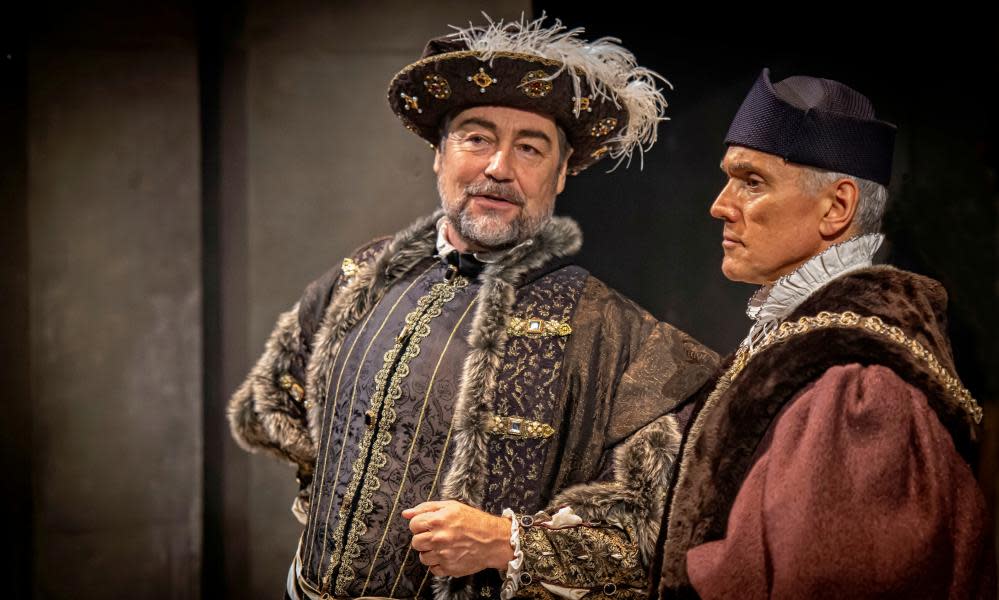The Mirror and the Light review – Cromwell’s spell is finally broken

It’s a truism all too well known to Thomas Cromwell that history is written by the victors. By the final volume in Hilary Mantel’s magisterial trilogy, Cromwell is on his way out, yet the dark magic of Mantel’s pen is such that the blacksmith’s boy from Putney has dominated the cultural landscape of the early 21st century – on page, stage and television – for almost as long as he did the political one of the 16th.
But all good things come to an end, and the evidence of this third and final play is that the spell is broken. We know that Cromwell’s failure to broker a successful fourth marriage for Henry, to Anna of Cleves, will lead to his execution. But this biographical inevitability sucks the life out of the project, returning the Tudor court to a parade of stuffed doublets. There are seven of them on stage within minutes of the curtain rising on Jeremy Herrin’s production, and it took most of the first half to work out which was which.
It’s not that the play is lacking in wit or grace. Co-written by Mantel with its star, Ben Miles, it mines some of the novel’s best scenes: when a newly wed Jane Seymour (a nicely po-faced Olivia Marcus) complains about the unreasonable demands of her husband, Cromwell and her retinue squirm with embarrassment before the reason is revealed: he wanted her to ride with him to Dover to inspect the fortifications. But this is more an interlude than part of a dramatic engine.

The Cromwell of the novel is a clerical genius, whose obsessive stocktaking illuminates not only his own interiority but the whole world of Tudor England. Here, ghosts stand in for colour and psychology: his father, in workman’s brown, heckles him for his failings, while Cardinal Wolsey drifts around in a haze of scarlet, reminding him of his duty to his better nature.
At the heart of it all is the relationship between an increasingly despotic monarch and the operator he cannot do without. Miles’s lean, silver-haired Cromwell mothers the king through his tantrums, but his shrewd eye becomes increasingly darting as he sees his advantage slipping away. Though Nathaniel Parker’s Henry is not as repulsive as the text suggests, age has puffed out his girth while shrinking his temper to a childish petulance as he drags his gammy leg around.
Related: The Mirror and the Light: curtain up for Cromwell – in pictures
After the death in childbirth of Jane Seymour, the pace quickens, the tone darkens and the production belatedly finds its mojo. Christopher Oram’s monumental concrete set, which at first seemed a blockade against the very porousness that is the key to Cromwell’s genius, is criss-crossed with light as the court dissolves into a ghastly masquerade. The beaky masks of all the aristocratic revellers mirror an earlier shadow play of the scythes and swords of the Pilgrimage of Grace, the popular uprising that was the start of Cromwell’s fall from grace.
The costumes enact a commentary of their own on the vagaries of the body politic: Nicholas Boulton’s wayward Duke of Suffolk sports ruched breeches, in pointed contrast with the mothy velvet of Nick Woodeson’s pompous Duke of Norfolk. Jane Seymour and Mary Tudor (Melissa Allan) are virtuous triangles, while Rosanna Adams’ refreshing Anna of Cleves is a resolute, and perfect, square. This is all very fine, but there’s no grief, no great release at the end, just a dull sense of a historical juggernaut juddering to a halt.
• At the Gielgud theatre, London, until 23 January.


